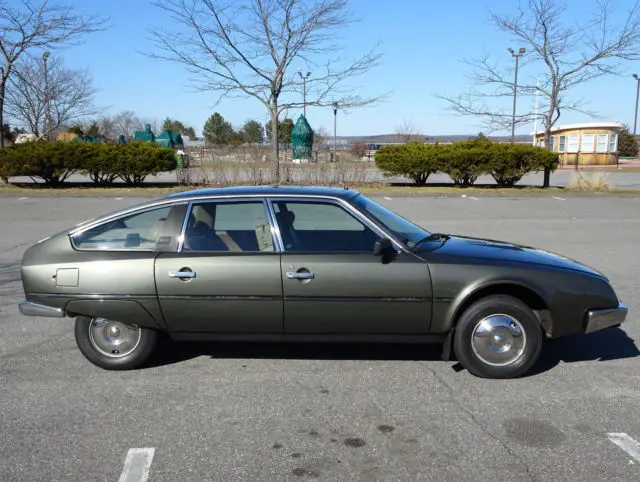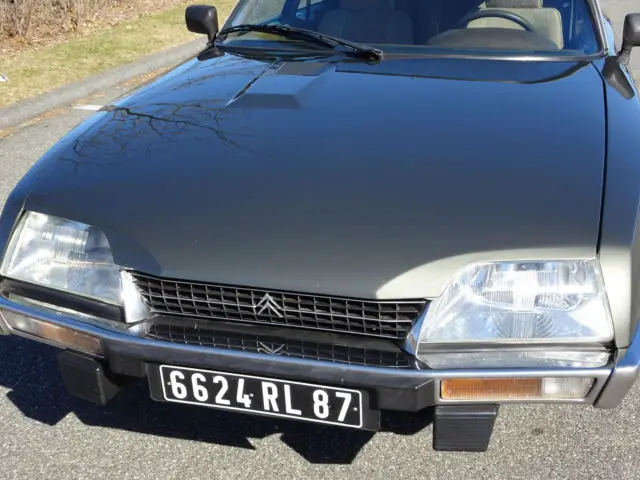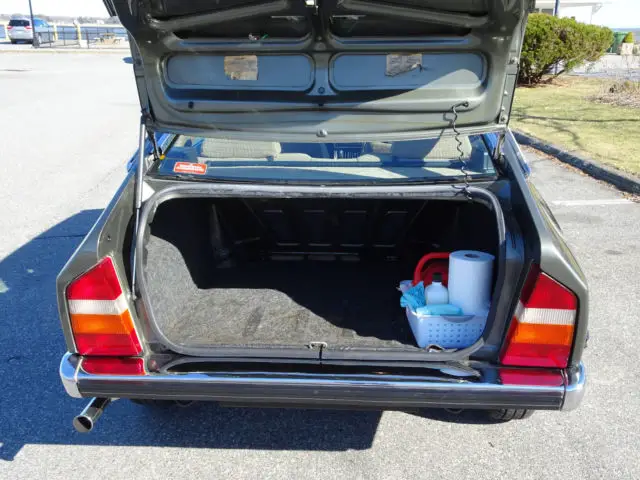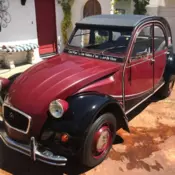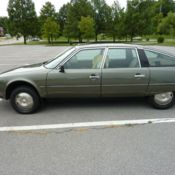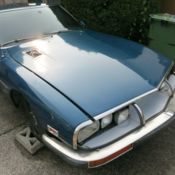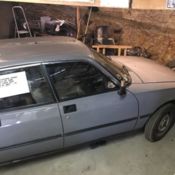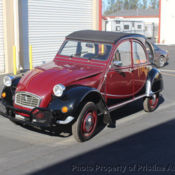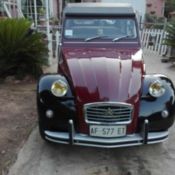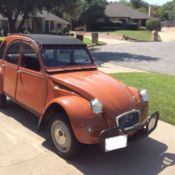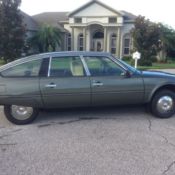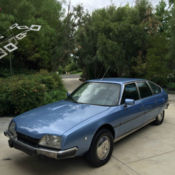1981 Citroen CX Athena 2.0L Sedan
| Condition: | Used |
| Make: | Citroën |
| Type: | Sedan |
| Trim: | CX Athena |
| Year: | 1980 |
| Mileage: | 95,028 |
| VIN: | VF7MAMP0006MP9412 |
| Color: | Bronze Metallic |
| Engine: | 2.0 L I-4 |
| Cylinders: | 4 |
| Fuel: | Gasoline |
| Transmission: | 5-speed Manual |
| Drive type: | FWD |
| Interior color: | Gold |
| Drive side: | Left-hand drive |
| Vehicle Title: | Clear |
| Item location: | Old Saybrook, Connecticut, United States |
| Extras |
| Listed by | Private seller |
Description of 1980 Citroën CX Athena |
|
Up for auction is my 1981 Citroen CX Athena. This is an unrestored and rarely seen Citroen model (in North America at least), that is in remarkably nice, original condition inside and out. The car is actually a 1981 model and the VIN is VF7MAMP0006MP9412. Ebay's system does not recognize the VIN because it is a European-spec car and it will not post a listing for a 1981 or newer car without a VIN, therefore the car is listed as a 1980 model in the headline. The Citroen CX is the last Citroen designed before the company was bought by Peugeot, and it is the last model credited to designer Robert Opron (he also oversaw design of the SM and GS models that were introduced in 1971). When it was introduced in 1975, the CX replaced the iconic DS model line that had been in production since 1956. The CX, while a new car, shared most of its oleo-pneumatic suspension, braking and steering assist technology with the DS, and most CXs are powered by an in-line, cam-in-block four based on the DS engine. Like the DS, the CX was marketed as a "business class" mid-size sedan, designed to efficiently transport a family of five in supreme comfort. For the 1981 model year, Citroen introduced a new base engine in the CX, an overhead-cam 2.0 L "Douvrin" four with a single Weber carburetor, built by a joint venture between parent Peugeot and the other French company, Renault. The example being offered in this auction is equipped with this engine, paired to a 5-speed manual transmission. The other important news for 1981, is that a new exterior paint process featuring electro-dip priming, clear-coated paint, and body cavity rust inhibitor was introduced in CX production in order to achieve better corrosion protection and a more lasting shine. I purchased this car from a Citroen enthusiast in Montreal, Canada two years ago. He originally imported it as a used car from the south of France in 2002. Proper U.S. Customs declarations were made and import duty was paid when the car came into the U.S. EPA and NHTSA exemptions were filed based on the car being over 25 years old at the time of importation. Available documentation, including service and parts receipts, dating back to 2004 will be provided with the sale. This car is a Series-1 CX which is identifiable by its stainless steel bumpers, detachable rear fender skirts, and illuminated drum-type speedometer and tachometer (the face-lifted Series-2 cars have plastic fascias, no skirts, and conventional round-faced gauges with pointers). It was factory equipped with air conditioning, stainless steel full wheel covers, and ribbed cloth upholstery with front and rear headrests. As of May 7, 2018 the odometer reads 52,933 kilometers and the true distance traveled is believed to be 152,933 km or 95,028 miles. Other than a minor rear impact that occurred at a stop sign, reported (and fully repaired) by the previous owner in Canada, the car has sustained no apparent accident damage. The car has not been repainted other than the left rear quarter and possibly the trunk lid, both of which match the rest of the car perfectly. There are some touched up stone chips in the paint, most visibly on the hood, and a couple of small stains in the clearcoat on the roof, possibly from bird droppings. The entire body exhibits an even gloss and appears to have been well cared for and garaged for most of its life. The body and floors appear to be rust-free. Likewise the interior is in very good original condition. There is a small black mark on the driver's seat bottom but otherwise the gold ribbed cloth upholstery is in remarkably good shape, with minor looseness in the front seat bottoms due to aging of the underlying foam squabs (typical of Citroens of this era). There is UV discoloration on some of the plastics on the inner door panels, notably the armrest/door closure handles, and a small failure of the vinyl skin of the LF door panel above the closure handle. The headliner is undamaged and the dash has no cracks. The carpets are in good condition as well. The flocking applied to the lower dash, particularly on the glove box lid, looks dingy (also typical for these cars). All glass appears to be original based on the markings and is in good condition except for a scratch apparently caused by a failure at the end of the wiper blade under prior ownership. The wipers, horn and lights all work properly. The right front turn signal assembly is a little loose fitting in the bumper. New halogen headlamp bulbs (white, not the yellow ones used in France) were recently installed. The car just completed an afternoon club tour with other Citroen cars covering a distance of about 150 km without any problems. It starts readily on the manual choke, the suspension pumps up quickly and the hydraulic function of the suspension spheres and brakes work well as they have since I acquired the car. Having said that, the car is not without its issues. The next owner will want to address the following: 1. The fuel gauge is not working. Until remedied, the tank should be refilled before exceeding a distance of 500 km since the last fill-up. (The trip odometer does work, thankfully.) 2. The AC does not function. All factory components appear to be in place. It is an R12 Freon system which will need to be repaired and recharged or converted to use modern R123a refrigerant. 3. Driver's door power window stopped working last summer. The problem is not the switch. The RF window works properly and they are on the same circuit supposedly. (Note: the rear doors have manual window cranks which do work properly.) 4. The carburetor may need to be rebuilt. The warm idle is too high and the engine exhibits some slight hesitation at part throttle. Occasionally the engine will after-run a little when shut off on a hot day. (The spark plugs were recently replaced, with no improvement to the hesitation - the old ones actually looked fine.) 5. The engine leaks oil, especially when parked after use. The culprit seems to be the gasket between the engine block and the cast aluminum oil sump. Replacing the gasket requires removing the engine, which I intended to delay doing until such time as the clutch needs replacement. 6. The front and rear suspensions are mounted on subframes that are connected by two longitudinal rails under the floor of the car. The body is mounted to these rails by ten screws that pass through rubber isolator biscuits which have deteriorated with age. New rubber biscuits have been purchased from Europe and are included with the sale (along with miscellaneous other spare parts). 7. The self-centering hydraulically assisted steering feels like it is trying to correct for a side wind as the car is driven on a straight road. Before attempting to diagnose this I would replace the body mount biscuits to be sure that one problem isn't aggravating the other. 8. The hand brake lever travel is too long, indicating that the parking brake cables need adjustment at the front wheels. 9. The manual choke knob can be quite stiff to pull out. Lubricating the cable from the ends helps some and it ought to be done a couple more times to attempt further improvement, or replace the cable. 10. The front door check links make a "snap" noise when closing the doors. Typical of Citroens of this era. Not sure of the cure - lubricating the links doesn't seem to help. Other things to note: The car at some point was equipped with an aftermarket electronic ignition box which has an override switch on it that supposedly will revert function to normal breaker point ignition if desired. The original (inoperative) dealer-installed AM-FM-cassette unit has been replaced with a modern AM-FM radio head with a built-in CD player, driving the factory-installed 4-speaker set-up. The battery has been fitted with a disconnect on the negative post, handy for periods of non-use. Typical of older European-spec cars, the radio is always powered, meaning that it has to be switched off manually whenever the engine is shut off. For some reason the new radio powers itself on automatically whenever the battery is reconnected, too, so the radio has to be manually switched off whenever you do that unless you intend to start the car. Otherwise the battery could become discharged inadvertently. The wheel size on this car is the standard 14" diameter (not the metric-size that later CX's had when equipped with optional Michelin TRX tires). The tires were replaced by the previous owner with Toyo 800 Ultra Premium Touring radials which still appear to be in good condition. The car is being sold with two sets of original keys, two 1981 CX owner's manuals - the original one in French and a second one I acquired from GB in English, the radio instruction booklet, an aftermarket CX service manual (which does not cover the so-called "Douvrin" OHC engine) and a complete, multi-lingual Citroen-issued CX service manual as originally used by dealers. The front and rear registration plates issued when the car was sold new in France will remain on the car. This vehicle is sold as is, where is, with no warranty implied or otherwise. No trades will be considered. Shipping and/or delivery are not included. Export arrangements are entirely the responsibility of the purchaser in the event that the car is going out of the U.S. Connecticut does not issue titles on cars 1981 and older. This car will be sold on a bill of sale made out to the purchaser. |
 Home
Home Contact us
Contact us NEWEST CARS
NEWEST CARS SELL YOUR CAR
SELL YOUR CAR FAQ
FAQ



